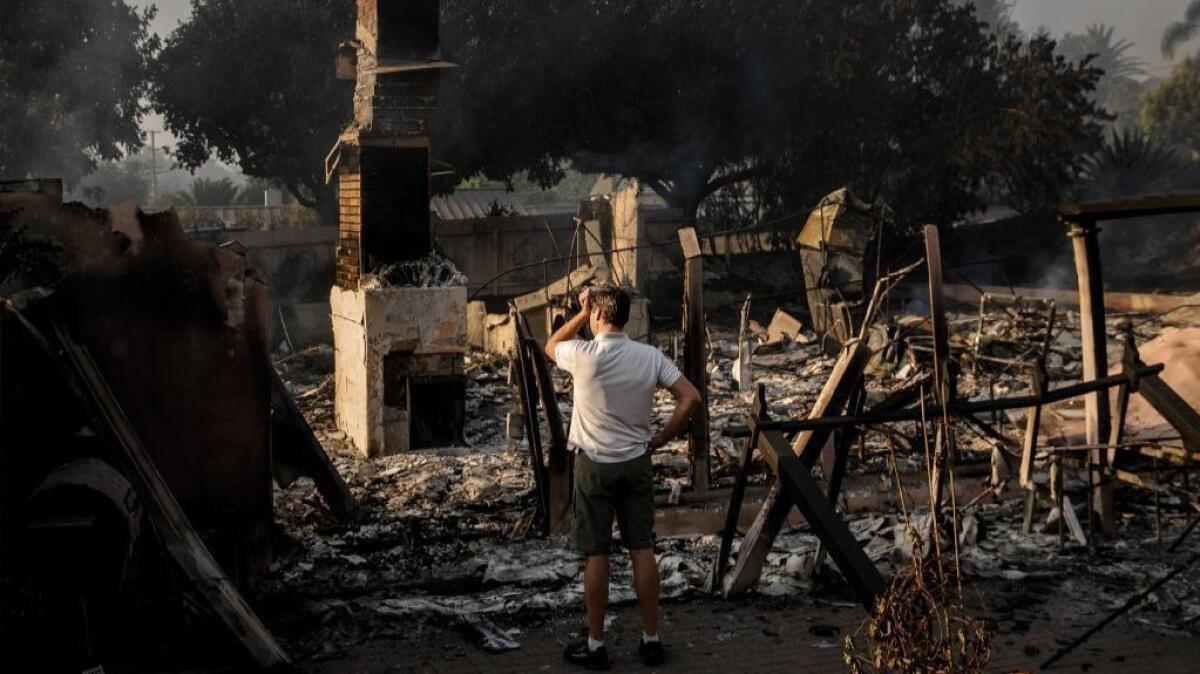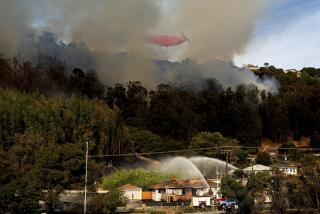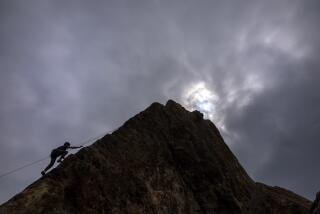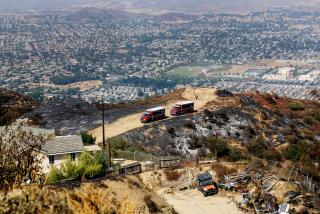Another night of terror and calamity for Santa Barbara County as new destructive fire sweeps through

Reporting from Goleta, Calif. — Carrie Givens heard the ferocious winds pick up Friday night, went outside and saw the flames quickly approaching.
“I said, ‘We gotta get out of here,’ ” said Givens, 63.
She and her husband, John, corralled five cats, and she grabbed a change of clothes, her passport, computer, camera and a pastel painting she had started. She had to leave behind finished paintings, her late mother’s ashes and baby photos of her three children.
The couple fled, but the four-bedroom, split-level house they’d lived in for a quarter of a century, built into a hillside overlooking their 10-acre organic vegetable farm, quickly disappeared into the firestorm.
It was another weekend of terror and loss in Santa Barbara County, which has endured more than its share of calamity in recent months.
The Givens’ home was among several structures destroyed in the hills above Goleta on Friday night and Saturday morning when a record heat wave and dangerous winds combined to fuel the Holiday fire. No deaths or major injuries were reported, officials said.
It was the perhaps the most destructive of several blazes that broke out across Southern California amid oppressive heat that set temperature records for the day.
Santa Barbara has a long history of natural disaster, particularly brush fires. But the last year has been staggering.
In December, the Thomas fire, the largest on record in California, ripped through Montecito, Carpinteria and other coastal cities, destroying more than 1,000 structures. Then in January, mudslides in the same area killed 21 people and destroyed more than 100 homes. The mudslides alone resulted in property damage claims of more than $421 million.
The ever-present threats to homes and lives and the frightening evacuation alerts are becoming all too familiar, said Santa Barbara County Supervisor Janet Wolf, who lost her home during the Painted Cave fire of 1990. She’s had to evacuate twice since.
“Unfortunately it is an occurrence that we have become very used to,” she said. “But that doesn’t take away from the trauma and the fear that people experience.”
The situation Friday night was especially terrifying and fast developing, fire officials said. When the Holiday fire broke out after 8 p.m., the temperature in Goleta was still 100 degrees. Then the sundowner winds picked up, a scenario that over the decades has spread many of Santa Barbara County’s most destructive fires.
“I’m convinced with that quickly advancing flame front, we would have had fatalities last night,” Santa Barbara County Fire Chief Eric Peterson said. “This scene has been repeated far too many times in our county over the last few years, and all of our hearts go out to those people who have lost everything.”
In January, very different extreme conditions became deadly. Intense downpours that far exceeded the forecast created massive debris flows in Montecito, a coastal town east of Goleta, burying homes and cars under mud and boulders.
By Saturday night, the 400-acre Holiday fire was 80% contained.
To the south in San Diego County, a fire in the Alpine area that destroyed 18 structures was 30% contained after burning about 400 acres.
The largest fire burning in the state was just south of the Oregon border, where it scorched 21,803 acres and destroyed 15 structures, with only 5% containment. One death has been attributed to the fire, but few details were immediately available.
As the heat wave eased slightly Saturday, residents in Goleta surveyed the destruction.
Eric Durtschi, 42, bent down and picked up the metal bones of three vintage rifles amid the charred remains of his rented hilltop home on Cuesta Verde.
“This one’s the 1873 Winchester,” he said, studying one of them before turning to another. “This is my grandfather’s right here.”
Durtschi, his wife and their six children moved into the house two weeks ago and hadn’t yet arranged for rental insurance.
The family had relocated from Utah after the school year. On Friday, two friends from Utah and their three children were visiting when Durtschi’s daughter smelled smoke shortly before 9 p.m.
Durtschi walked outside and saw smoke everywhere. He ordered family members to leave, while he and his friend grabbed his father’s guitar and some other keepsakes.
“When we came out, there were fist-sized embers falling all over the place,” he said.
The family stayed the night with friends. Then Durtschi went to Santa Barbara to pick up his two oldest sons, who had been with a church youth group all week and didn’t know what had happened.
“I need to come up with a plan and be strong so the kids aren’t more scared than they already are,” he said. “I had no idea the flames could go that fast.”
As with many fires, the flames hopscotched neighborhoods in unpredictable patterns, leaving some structures untouched, others burned to the ground.
The destruction could have been worse when winds picked up at sundown Friday. But firefighters had been forewarned by a National Weather Service advisory and were already deployed, ready to go into action quickly.
Peterson, the Santa Barbara County fire chief, commended residents for quickly evacuating their homes.
Many fled without being warned, after noticing the wind pick up or smelling smoke. Officials were reluctant late Saturday to verify an early estimate by officials of 20 structures destroyed, calling it guesswork at this stage.
The American Red Cross set up a shelter for evacuees at the Goleta Valley Community Center. Sixty-one people stayed overnight, said spokeswoman Cindy Huge. Most were over 65; a few were children. By Saturday afternoon, only a handful remained.
Late Saturday, mandatory evacuations still were in effect for 600 people, Santa Barbara County Sheriff Bill Brown said. He advised residents to keep cellphones fully charged and be ready to leave again if conditions change.
The temperature in Goleta reached 102 degrees Friday and 105 degrees Saturday, but was expected to drop 20 degrees Sunday.
Record temperatures Friday and Saturday contributed to extreme fire conditions throughout the region, although higher humidity in some areas Saturday also led to a few showers and thunderstorms.
Firefighters battling the Valley fire in San Bernardino County suddenly had to make way for flash flooding and mudflows. That blaze began Friday afternoon, burning 1,000 acres. A day later it was only 5% contained, forcing the continued evacuation of Forest Falls, which has about 1,000 residents.
Flames were moving north and east, pushing higher into the steep terrain of the San Gorgonio Wilderness. To this point, no homes have been destroyed, said Cathey Mattingly, public information officer for the California Department of Forestry and Fire Protection.
There were at least three fires in San Diego County, including the West fire, which hit the Alpine area and forced 2,400 to evacuate. It ignited about 11:25 a.m. and scorched 400 acres before firefighters stopped its forward progress about five hours later. Two firefighters were hospitalized, with one suffering heat-related injuries and another slight burns to his face.
“Crews are making good progress,” said Cal Fire Capt. Kendal Bortisser. The number of structures destroyed and damaged was likely to go up.
An overnight shelter was set up at Los Coches Creek Middle School on Dunbar Lane.
“We just grabbed everything you can’t replace or rebuy,” said Ben Stanfill, who was at the shelter late in the day after a frantic evacuation of his mother’s house. “My grandma’s photographs, the cat, my sister’s Mickey Mouse teddy bear she’s had since she was little.”
“Now we just wait and see,” he said, sitting on a rock outside the shelter, sweating.
The temperature in Alpine reached 112 degrees Friday and 104 degrees Saturday. The forecast for Sunday is 97 degrees. More gradual cooling is expected throughout the region Monday.
Castillo reported from Goleta, and Khan and Blume from Los Angeles. San Diego Union-Tribune staff writers John Wilkens and Teri Figueroa contributed to this report.
More to Read
Sign up for Essential California
The most important California stories and recommendations in your inbox every morning.
You may occasionally receive promotional content from the Los Angeles Times.












